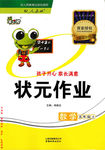题目内容
That was______ was first called “India” by Columbus.
A. what B. where
C. ale place D. then, where
A
本题考查主语从句。what引导主语从句,且作was called的主语。

 优百分课时互动系列答案
优百分课时互动系列答案 开心蛙状元作业系列答案
开心蛙状元作业系列答案William Butler Yeats, a most famous Irish writer, was born in Dublin on June 13, 1865. His childhood lacked the harmony (和睦) that was typical of a happy family. Later, Yeats shocked his family by saying that he remembered “little of childhood but its pain”. In fact, he inherited (继承) excellent taste in art from his family—both his father and his brother were painters. But he finally settled on literature, particularly drama (戏剧) and poetry.
Yeats had strong faith in coming of new artistic movements. He set himself the fresh task in founding an Irish national theatre in the late 1890s. His early theatrical experiments, however, were not received favorably at the beginning. He didn’t lose heart, and finally enjoyed success in his poetical drama.
Compared with his dramatic works, Yeats’s poems attract much admiring notice. The subject matter includes love, nature, history, time and aging. Though Yeats generally relied on very traditional forms, he brought modern sensibility to them. As his literary life progressed, his poetry grew finer and richer, which led him to worldwide recognition.
He had not enjoyed a major public life since winning the Nobel Price in 1923. Yet, he continued writing almost to the end of his life. Had Yeats stopped writing at age 40, he would who probably now be valued as a minor poet, for there is no other example in literary history of a poet Auden wrote, among others, the following liners:
Earth, receive an honored guest:
William Yeats is laid to rest.
Let the Irish vessel (船) lie
Emptied of its poetry.
【小题1】Which of the following can describe Yeats’s family?
| A.It filled Yeats’s childhood with laughter. |
| B.It was shocked by Yeats’s choice. |
| C.It was a typically wealthy family. |
| D.It had an artistic atmosphere. |
| A.Yeats founded the first Irish theater. |
| B.Yeats stuck to modern forms in his poetry. |
| C.Yeats began to produce his best works from the 1910s. |
| D.Yeats was not favored by the public until the 1923 Noble Prize. |
| A.Envy. | B.Sympathy. |
| C.Emptiness. | D.Admiration. |
| A.Yeats’ literary achievements. |
| B.Yeats’ historical influence. |
| C.Yeats’ artistic ambition. |
| D.Yeats’ national honor. |